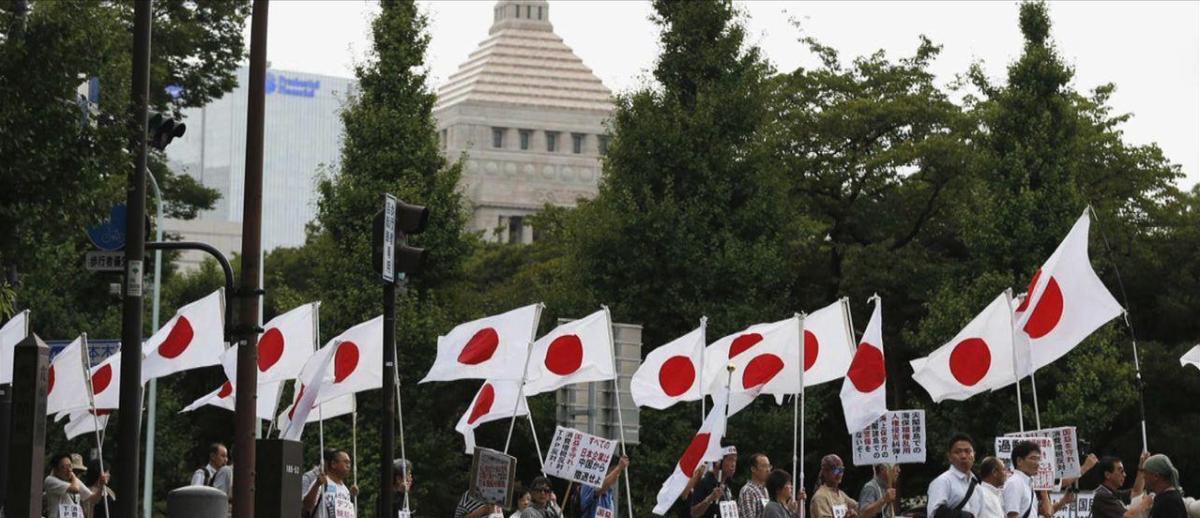Japanese Constitutional Principles as a Bridgehead to Global Democracy
archive


marchers outside of the National Diet building in Tokyo.
Japanese Constitutional Principles as a Bridgehead to Global Democracy
Groundswells of politico-social movements emerge in times of transition and in the name of the people. These waves arrive on the scene with a discourse of democracy and nationalism. Contemporary populism is also such a movement, proliferating on a global scale and spreading across even liberal democratic nation-states. In light of this broad upsurge, we are faced with the task of explaining: i) the difference between populism in general and contemporary populism (neo-populism) in particular; ii) the connection between neo-populism on the one hand, and liberal democracy and nationalism on the other; iii) neo-populism’s appearance as a global syndrome, and its configurations in the age of globalization. In this essay I will try first to give a theoretical explanation of populism and of its Japanese variant, and then I probe for an alternative to the negative trends of neo-populism starting from the principles of the Japanese Constitution.
Populism and liberal democracy
The appeal of populism has been associated with some forms of democratic rhetoric and the principle of indirect (representative) democratic government. Representative government is a “unity in contradiction” whose components include “populistic and popularistic” elements: that is, it is characterized by direct demands from below and a representative government from above. This contradictory vector is dormant in relatively stable times but the populistic element becomes more prominent in times of transition, together with a popularistic mobilization by some populistic leaders.
Neoliberalism is a counter-ideology that proposes policies against welfare liberalism imbedded in the socio-economic structure of a post-World War II belle époque. It has produced a characteristic turn, exemplified by ‘flexicurity’ under austerity policies and the transformation of a global system of production. The revolt of neo-populism as a global syndrome is a reaction to this trend, especially after the great recession of 2007-2008. The revolt of neo-populism, whether positively or negatively judged, reflects a search for alternatives.
Populism in relation to nation and nationalism
The nation is a result of historical processes. Put simply, it has been configured through an emotional consciousness of belonging to the same community, of sharing time, space, and life. But nationalism is not established without democracy. Its ingredients are a composite of ethnic and civil elements, whose combination differs according to its formation in history as is discernible, for instance, in Japan and the US. Nation and nationalism are a cohesive element for the integration of statehood beyond social categories such as class, gender, and generation.
The concepts of nation and people have a certain terminological interchangeability. This is due to the inclusion of inhabitants in the idea of the nation-state, where each nation is identified with its people as a civic category. Therefore, this socio-economic entity appears like a “container” for a national or a popular sovereignty, and an appeal to the nation strikes a strong chord in the people’s ‘native’ heart. The cogency of neo-populism springs from this valence.
Distinguishing rhetoric of neo-populism
Contemporary globalization is assumed by some to have begun taking shape in the 1980s under the shadow of the neoliberal transformation of the capitalist system within and beyond the boundaries of nation-states. It is not, however, a straightforward trajectory, but a contradictory (pro- and counter-) tendency of movement inasmuch as its driving force is expressed in the words “glocalization” or “fragmegration” (the overlapping of fragmentation and integration tendencies). [N.] The rise of neo-populism, especially in its right-wing form, is a reflection of a counter-tendency to integration and an appeal to particularity.
an appeal to the nation strikes a strong chord in the people’s ‘native’ heart. The cogency of neo-populism springs from this valence.
Neo-populism has no single distinguishing ideology but relies on a discourse of “the people,” and its local shapes vary according to the characteristic composition of statehood. But we can ascertain points of resemblance among its diverse manifestations. First of all, critical researchers find the relics of a friend vs. enemy paradigm. Right-wing neo-populism, for example, divides the people of the same country into “productive mass” and “parasitic elite” in order to support an authoritarian anti-establishment rhetoric. Second, neo-populist movements have a propensity to support direct democratic mechanisms such as referendums and plebiscites, which leads to demands for rapid decisions and execution of policies, as well as a declining sense of the relevance of parliaments. Parliament is now apt to lose its function as an institution controlling the executive and advancing democracy through deliberations over policy among political parties. Instead it is regarded as an assemblage of particular interests, which represent the power of each electoral district’s economic-corporate center of gravity. Third, neo-populism strongly appeals to nationalism and to civic particularity, evoking cathexis through ethno-nationalism and a catharsis effect to dispel preset discontents by inspiring exclusionary politics, as is discernible in xenophobic chauvinism. Exclusionism has been agitated not only by appeals relating to the threats of immigration, but also by intensification of competition between state under conditions of globalization.
The populistic tendency in Japanese politics
Japanese nationalism characteristically takes an ethnic rather than civic emphasis. It is prone to an authoritarian statism. We cannot find the term “people” in the present Japanese Constitution; instead the “people” is displaced by the term “nation.” What are the features of such a nationalistic populism given ongoing globalizing dynamics?
Although Japanese politics is not a counterpart of British Euroskepticism and its anti-immigration movement, it faces some predicaments which the incumbent political party tries to manage through authoritarian policies grounded in the necessity of economic prosperity and national security. These trends are discernible in a few areas.

First, there are moves toward military buildup and related internal surveillance under the pretext of preparing for external threats. This is observable in recently enacted policies relating to internal security and a reinforcement of the military alignment with the US. Second, in relation to the proposed amendment of the Constitution, there are trends toward historical revisionism related to the bad stigma of Japanese imperialistic invasions during the Second World War, which has lingered in the consciousness of conservatives. The right wings of the governing party recognize the necessity of erasing this stigma in order to reconstruct patriotism through the retrospective values latent in traditional Japanese political culture. Japan’s patriarchal culture remains largely intact in the structure of its socio-economic organization. Third, austerity through neoliberal policies has resulted in an enormous national debt and unstable employment, as well as income imbalances. The governing party has designed a ‘flexicurity’ project as a response to non-regular employment and working conditions. Furthermore, there appears a hidden collusion between the executive and the state bureaucracy. Although these contradictions can lead to populistic mobilization, there is no populist third party in Japan, and the incumbent conservative party has performed its part in answering the people’s hope for “trickle-down” effects through the means of a strengthened national security and competition state.
In opposition to this neo-populist trend there is a strong-willed movement to keep the fundamental principle of the right to live in peace and welfare, as guaranteed by the Japanese Constitution.
Some relevant remarks from the Japanese Constitution
The concept of “the people” has cogency and valences beyond spatial-temporality. This means, first, that a coupling of the people with populism corresponds to a coupling of nation with nationalism. This correspondence works as a fulcrum in politics. Second, “the people” are used synonymously as populace (common persons) from the viewpoint of class relations, in contrast with the elite or the establishment. Then, the consciousness of a collective self as a class (or socioeconomic status) and as a nation becomes strongly persuasive. Given these propositions, it is necessary to consider the positive and negative attributes of populism in relation to ongoing globalization processes.
there is no populist third party in Japan, and the incumbent conservative party has performed its part in answering the people’s hope for “trickle-down” effects through the means of a strengthened national security and competition state.
On the one hand, it should be emphasized that nationalism has two sides: that is, nationalism and internationalism are inseparably related each other because identification entails a distinction from others. Globalization bring about the necessity to reconsider the intersubjectivity of the nation-state and its wider interrelations from the perspective of the subject-object relationship. This means that it is necessary not only to remove the causes of threat and anxiety, but reflexively also to relativize the impression one nation’s behavior makes on others. This means that we are living in a growing intersubjectivity under ongoing globalization. The exclusionism of far-right neo-populism only incurs antagonism between nations.
On the other hand, from the standpoint of class or socioeconomic status, there is an extreme disparity in income. Neoliberal globalization has displaced its accumulated contradictions downward, onto the lower and middle classes and underdeveloped countries. The rise of social conflicts, status revolts, and refugee crises is compelled by these driving forces of corporate possessivism around the world. Therefore, it is necessary that its impulse be controlled according to the principle of developmental democracy to enhance a person-based individual autonomy.
Third, in representative democracy, incumbent parties cannot aptly express the will of the “discontents” in their political visions based on the present shape of globalization. The rise of far-right neo-populism mirrors the need to develop democracy in the age of globalization.
The Japanese Constitution vindicates an important vision for developmental democracy. Its core principle is the right of living in peace, which is a conjoined expression of respect for basic human rights, permanent pacifism, and national (popular) sovereignty (or autonomy). It points to a democratization of the nation-state as a bridgehead to the construction of global democracy. It seems necessary and urgent to recognize again this ideal in the age of globalization.
1. The term was coined by James Rosenau. See his Distant Proximities: Dynamics beyond Globalization (Princeton: Princeton University Press, 2003)
-------. "A Review of Basic Concepts for Understanding the Contemporary State under Globalization." Ritsumeikan Law Review 33, June 2016.



